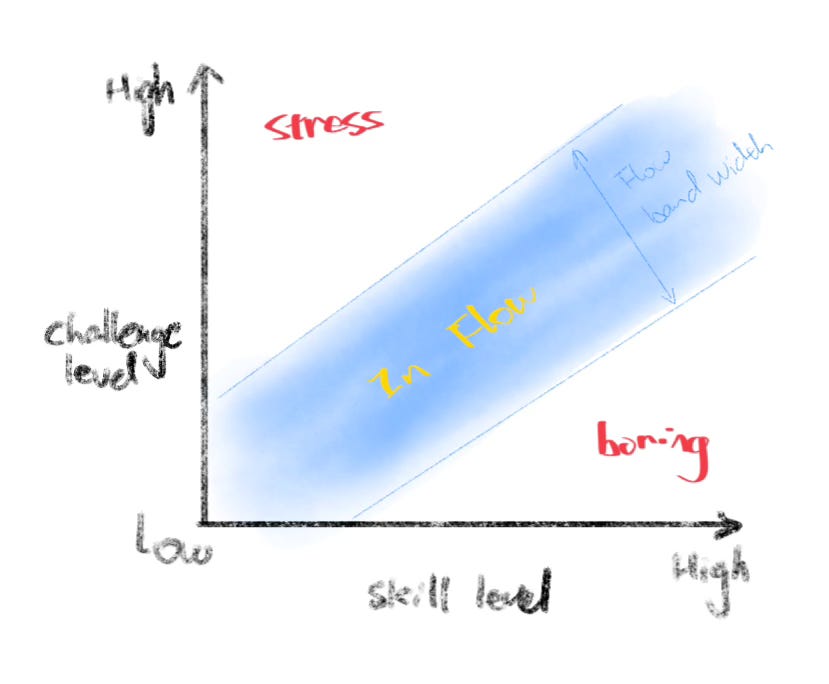[Book Club] Flow and Internet Attention Market
Remember we discussed motivations in the post Run with the Wind?
In that post, I mentioned that it is difficult to understand why one chooses running. It is such a painful experience. Even clueless people like me are practicing it, bearing the suffering from it, and expecting to get better.
Someone might say: “The meaning of life is to enjoy life itself and experience everything that happens, good or bad.” Or anything similar to this. However, I don’t know your reaction to this “famous” statement. I never felt a connection to it. It is too vague, too arrogant, and too light to grasp. I didn’t want to offend anyone but only wanted to roll my eyes whenever I heard it. Yeah, that’s YOUR opinion. My aim in hiking is to get to the top. My aim in playing sports is to win. My aim in training is to win faster and easier. My aim in developing technology is to sell products. What does focusing on the process mean?
Well, now, after reading this book, I finally get the answer, at least partially. I think you would like to know as well. Why experience over result?
Three-Sentence Summary
Happiness is when people can determine the quality of their lives through learning to control their inner experiences. Flow is the word used to describe that in-control moment. It has conditions and characteristics and can be learned.
Who Is This Book For?
Anyone who wants to lose themselves in doing things. It can be out of productivity. It can be in search of happiness. It can also help to understand what is happening.
Major Concepts
I will use the quote from the book to describe what flow is.
A sense that one’s skills are adequate to cope with the challenges in a goal-directed, rule-bound action system that provides clear clues as to how well one is performing. Concentration is so intense that no attention is left to think about anything irrelevant or worry about problems. Self-consciousness disappears, and the sense of time becomes distorted.
To summarize, three conditions to cultivate flow:
A clear goal.
Concentration.
The challenge level is slightly above the skill level.
On-time feedback loop.
Example. Writing a newsletter about a topic I just learned is challenging. I must concentrate on my reasoning, choice of words, and text structure. To make the task less stressful and the article less like my own imagination, I will do lots of research on it. When I have sufficient material and a well-laid structure, the only thing left is to fill the content with words and graphs. The entire process needs concentration. I purposefully select a topic that is not too difficult for me to understand. I research to reduce the challenge further. When one section is finished, I can read through and enjoy the fluency and sound reasoning of the logic. The conversion of input material to output knowledge is the best feedback to learn new things alone. And, of course, when my readers come to me to discuss the post after reading it, I receive precious feedback.
Now, let’s go back to the opening question. What does this book have to do with the pursuit of process?
You might guess it from the quote above. “In the flow” is the happiness moment. It happens during the work when all conditions are met, not after. Runner’s high, coder’s zone, monk’s zen. Worth meaning, flow is a double-sided sword. Cheap flow, like drug addiction, food addiction versus food appreciation, sex addiction, etc., can also harm.
Internet Attention Market
After discussing a very chilled and positive experience, we now need to look at one thing that is not so pleasant at all. As we mentioned, cultivating flow needs one crucial ingredient: concentration. For everyone, it is a sacred resource. It requires lots of energy to form; therefore, it is limited. It can raise the attention of our conscious mind; therefore, it can cause (continuous) action. According to the definition of economics, it is tradable goods.
And that is how many internet technologies treat us: sources of goods.
The recommendation algorithm is a famous example. Undoubtedly, it gets you new, fresh, relevant content or items faster. It also captures your attention for longer than you need. It is done to hold you on the news website, YouTube, Netflix, Steam, etc. Don’t beat yourself up when you spend too much time on it. It is purposefully designed and improved by one of the smartest computer scientists. There is competition with huge prizes to improve even 1% of its performance. It will be worse if you feel empty and self-disgusted after speeding all the time on it.
Put everything together; don’t let the noise steal your happiness. Try to hold your attention and concentrate on what matters.
I would like to hear your story of flow.
Ref.
Tong, L. C., Acikalin, M. Y., Genevsky, A., Shiv, B., & Knutson, B. (2020). Brain activity forecasts video engagement in an internet attention market. Proceedings of the National Academy of Sciences, 117(12), 6936-6941. https://doi.org/10.1073/pnas.1905178117
Attention economy. (2024, January 1). In Wikipedia. https://en.wikipedia.org/wiki/Attention_economy
Want your friends to know about this newsletter? Share them!




